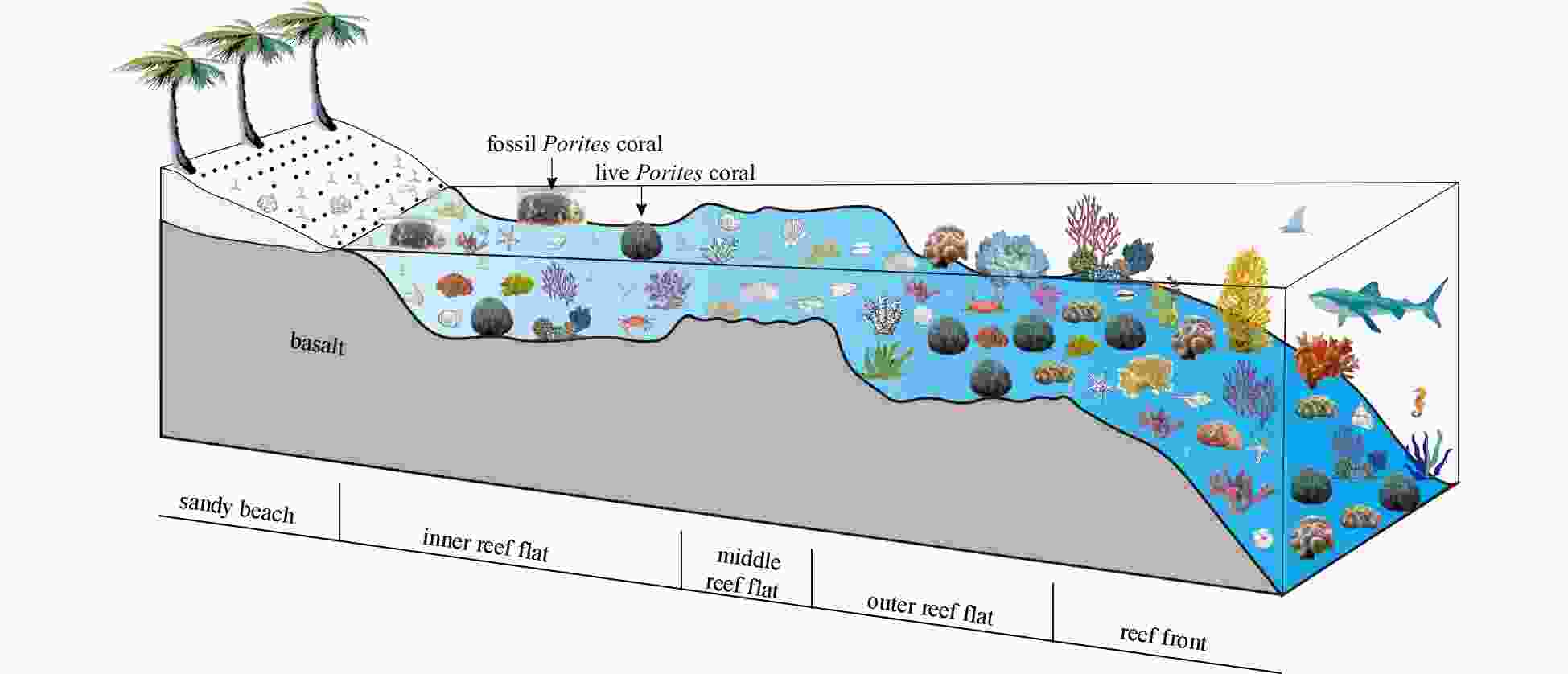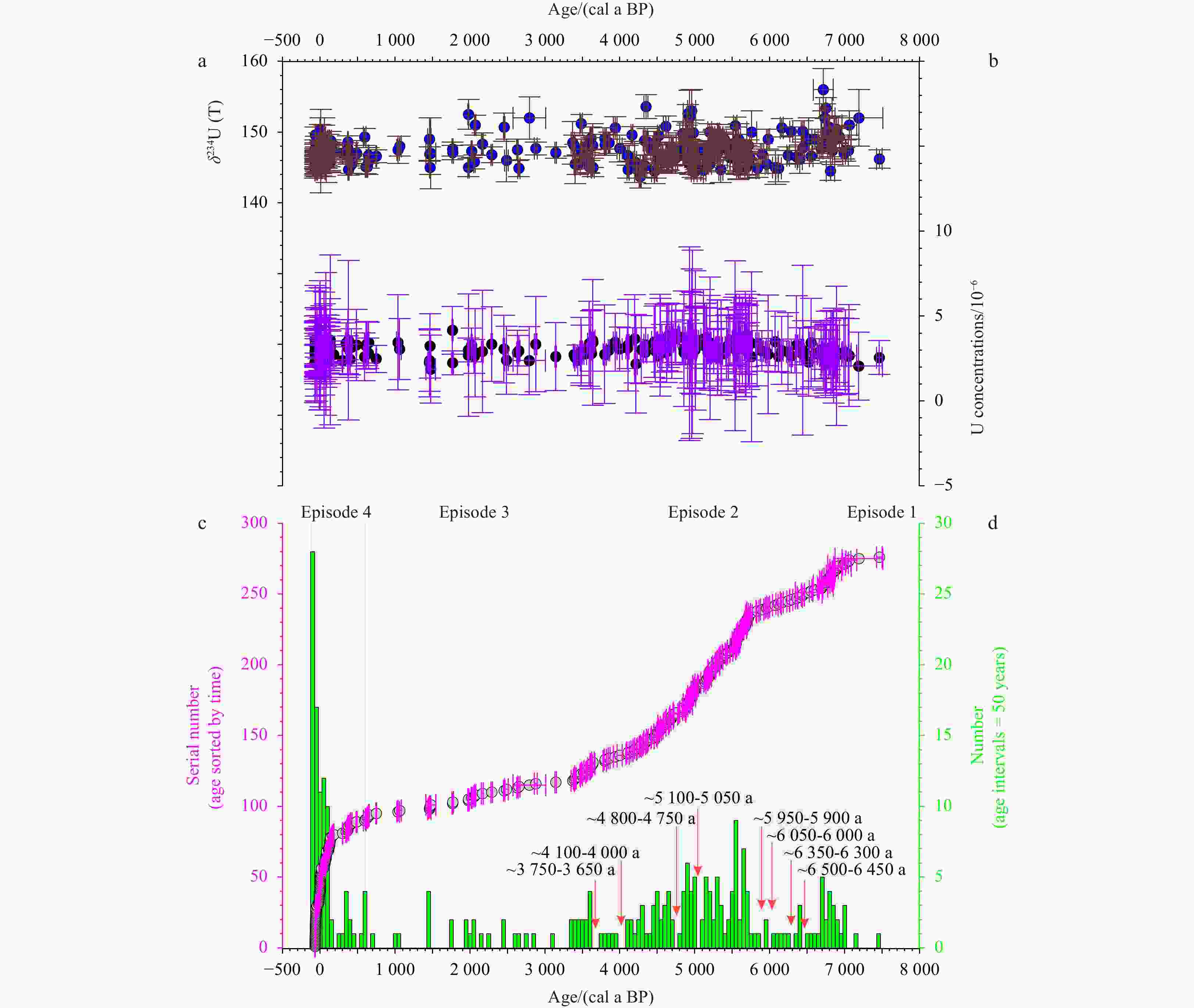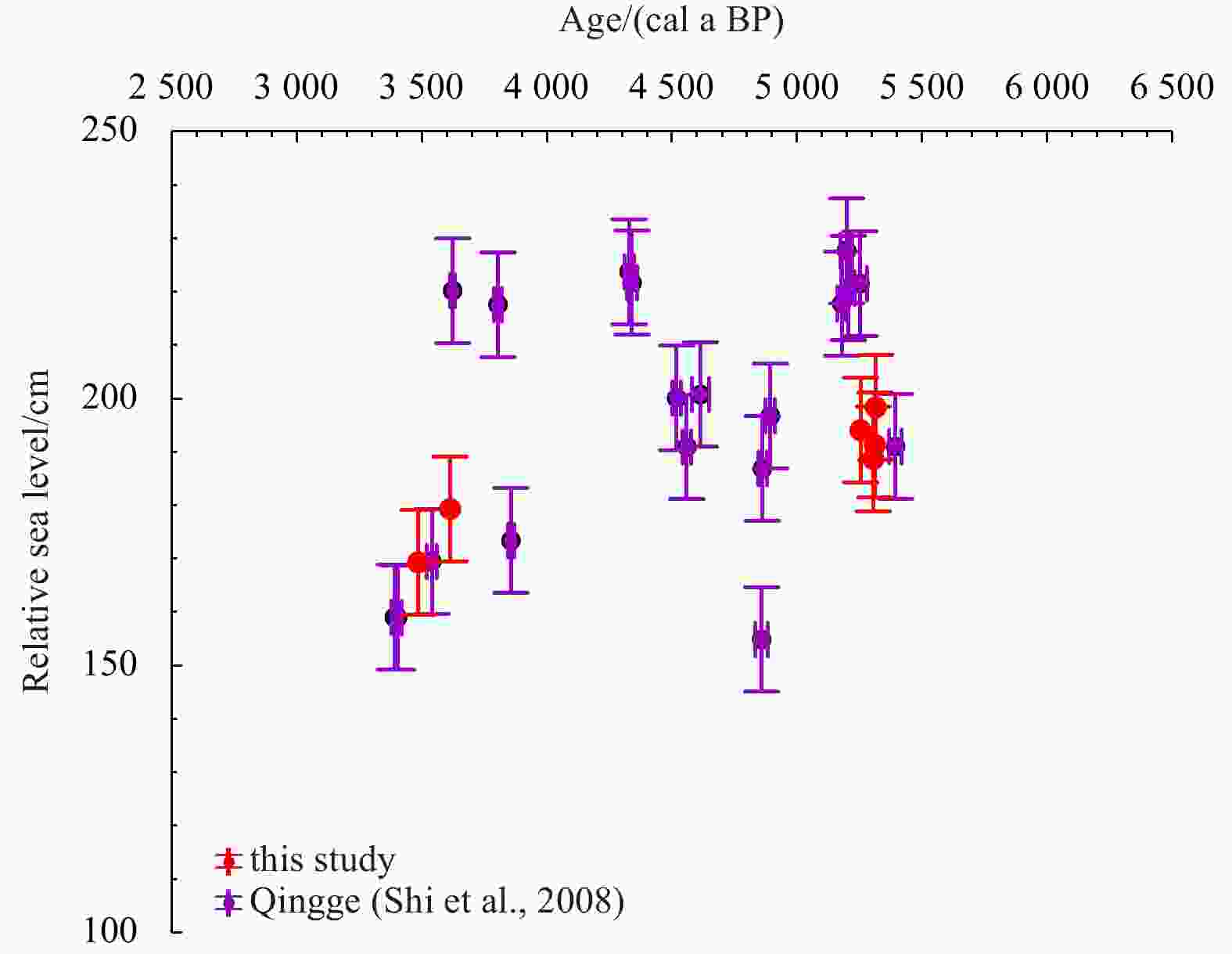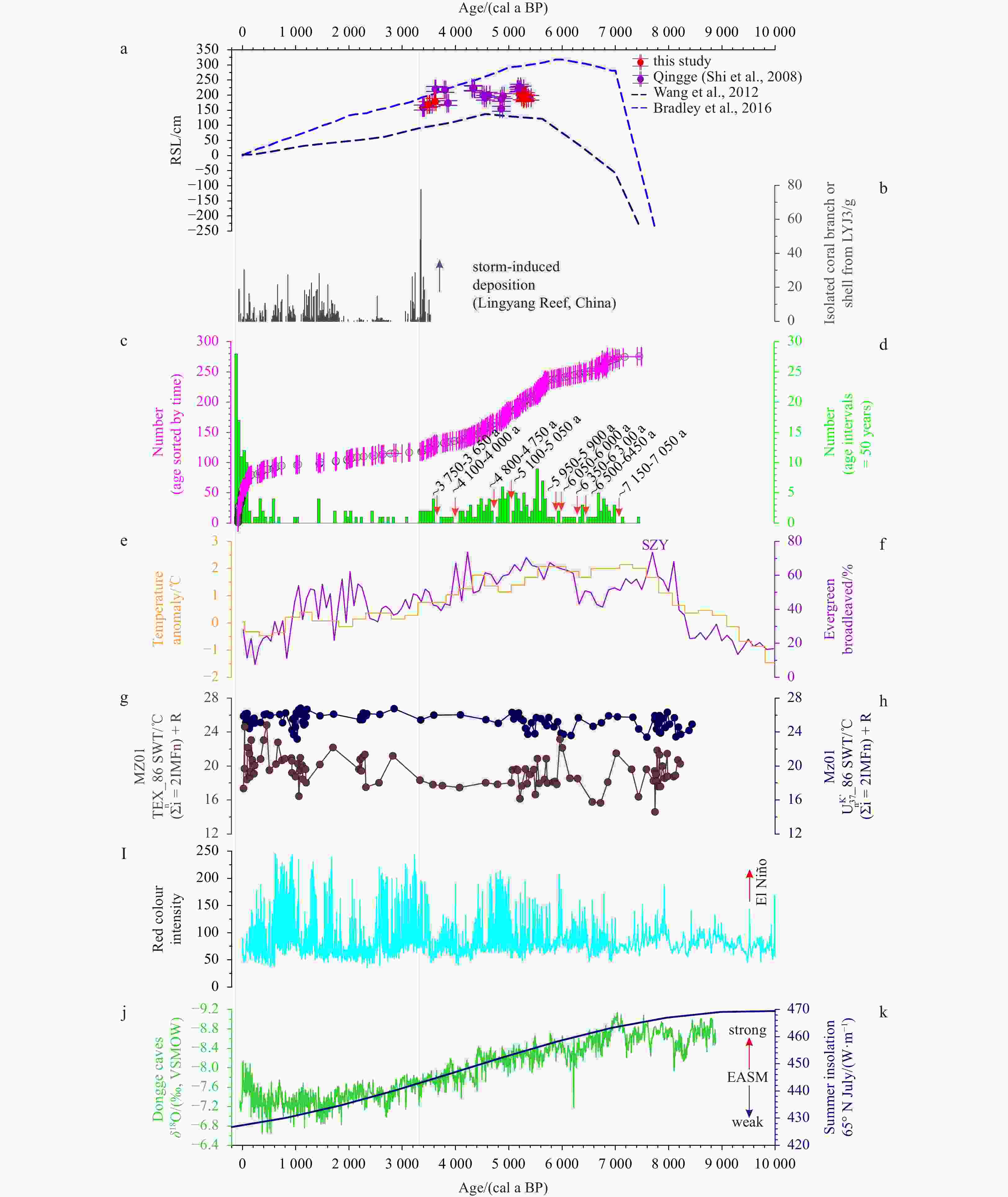Coral records of Mid-Holocene sea-level highstands and climate responses in the northern South China Sea
-
Abstract: High-resolution sea-level data and high-precision dating of corals in the northern South China Sea (SCS) during the Holocene provide a reference and historical background for current and future sea-level changes and a basis for scientific assessment of the evolutionary trend of coral reefs in the SCS. Although sporadic studies have been performed around Hainan Island in the northern SCS, the reconstructed sea level presents different values or is controversial because the indicative meaning of the sea-level indicators were neither quantified nor uniform criteria. Here, we determined the quantitative relationship between modern living coral and sea level by measuring the top surfaces of 27 live Porites corals from the inner reef flat along the east coast of Hainan Island and assessed the accuracy of results obtained using coral as sea-level indicators. Additionally, three in situ fossil Porites corals were analyzed based on elevation measurements, digital X-ray radiography, and U-Th dating. The survey results showed that the indicative meanings for the modern live Porites corals is (146.09 ± 8.35) cm below the mean tide level (MTL). It suggested that their upward growth limit is constrained by the sea level, and the lowest low water is the highest level of survival for the modern live Porites corals. Based on the newly defined indicative meanings, 6 new sea-level index points (SLIPs) were obtained and 19 published SLIPs were recalculated. Those SLIPs indicated a relative sea level fluctuation between (227.7 ± 9.8) cm to (154.88 ± 9.8) cm MTL between (5 393 ± 25) cal a BP and (3 390 ± 12) cal a BP, providing evidences of the Mid-Holocene sea-level highstand in the northern SCS. Besides that, our analysis demonstrated that different sea-level histories may be produced based on different indicative meanings or criteria. The dataset of 276 coral U-Th ages indicates that coral reef development in the northern SCS comprised the initial development, boom growth, decline, and flourishing development again. A comparison with regional records indicated that synergistic effects of climatic and environmental factors were involved in the development of coral reefs in the northern SCS. Thus, the cessation of coral reef development during the Holocene in the northern SCS was probably associated with the dry and cold climate in South China, as reflected in the synchronous weakening of the ENSO and East Asian summer monsoon induced by the reduction of the 65°N summer insolation, which forced the migration of the Intertropical Convergence Zone.
-
Key words:
- northern South China Sea /
- Middle Holocene /
- sea-level highstand /
- Porites corals /
- climate response
-
Figure 1. A geographic map of South China Sea, showing the location of Hainan Island. a. Surface-ocean circulation patterns in the South China Sea during the East Asian Summer Monsoon (EASM) and b. the East Asian Winter Monsoon (EAWM)), modified after Yu and Liu (1993) and Morton and Blackmore (2001). c. Coral reefs are distributed along the coast of Lei-Qiong. d. The elevation survey and sampling during the field investigation from Wenchang southward to Qionghai along the east coastal Hainan Island in July 2020.
Figure 3. Precise height measurement results of the top surface elevation of the 27 live Porites corals from Tongguling along the coast of Wenchang, Hainan Island. It showed that the upper surface elevations of those live Porites corals were 146.09 cm below the MTL on average. The depth range of live Porites corals heights is relative to 1985 National Elevation Benchmarks and the predicted tidal levels at Qinlan Port tide gauge. The mean tide level (MTL) lies 103 cm above 1985 National Elevation Benchmarks, the mean low water (MLW) is 58 cm, the mean high water (MHW) is 147 cm, the highest high water (HHW) is 315 cm, the lowest low water (LLW) is −28 cm, the mean tidal range is 89 cm, and the maximum tidal range is 255 cm (China Nave Hydrographic Office, 2022).
Figure 5. Distribution of the δ 234U (T) variations (a), the U concentrations (b) and U-Th ages (c) for the 276 in situ dead Porites, Porites microatolls and coral-related debris from the northern SCS. Episodes of corals growth from the northern SCS during the Holocene based on the U-Th ages order and its’ two standard deviations (50-year interval) of the age determination errors (±2σ) (d).
Figure 7. Comparison of Mid-Holocene RSL data with the predictions of the ICE-4G model (Wang et al., 2012) and the outputs of the final ice-volume equivalent sea-level model from Bradley et al. (2016) (a), storm records from Lingyang Reef (Yue et al., 2019) (b), coral U-Th ages distribution pattern derived from the in situ dead corals on the coast of northern SCS (c, d), the reconstructed temperature (relative to the present) from China (Wang and Gong, 2000) (e), subtropical evergreen broadleaved percentage (Yue et al., 2012) (f), the sea surface temperatures (SSTs) of Core MZ01 from the continental shelf of the East China Sea (Pan et al., 2020) (g, h), reconstruction of El Niño occurrences from Laguna Pallcocha, Ecuador (Moy et al., 2002) (i), δ 18O records (‰, VSMOW) from the stalagmite of Dongge Cave (Wang et al., 2005) (j), and the 65°N summer insolation in July in the Northern Hemisphere (Berger and Loutre, 1991) (k).
-
Anderson T R, Fletcher C H, Barbee M M, et al. 2015. Doubling of coastal erosion under rising sea level by mid-century in Hawaii. Natural Hazards, 78(1): 75–103, doi: 10.1007/s11069-015-1698-6 Angulo R J, Giannini P C F, Suguio K, et al. 1999. Relative sea-level changes in the last 5500 years in southern Brazil (Laguna–Imbituba region, Santa Catarina State) based on vermetid 14C ages. Marine Geology, 159(1-4): 323–339, doi: 10.1016/S0025-3227(98)00204-7 Banerjee P K. 2000. Holocene and Late Pleistocene relative sea level fluctuations along the east coast of India. Marine Geology, 167(3-4): 243–260, doi: 10.1016/S0025-3227(00)00028-1 Bard E, Arnold M, Fairbanks R G, et al. 1993. 230Th-234U and 14C ages obtained by mass spectrometry on corals. Radiocarbon, 35(1): 191–199, doi: 10.1017/S0033822200013886 Bard E, Arnold M, Hamelin B, et al. 1998. Radiocarbon calibration by means of mass spectrometric 230Th/234U and 14C ages of corals: an updated database including samples from Barbados, Mururoa and Tahiti. Radiocarbon, 40(3): 1085–1092, doi: 10.1017/S0033822200019135 Barkley H C, Cohen A L, Mollica N R, et al. 2018. Repeat bleaching of a central Pacific coral reef over the past six decades (1960–2016). Communications Biology, 1: 177, doi: 10.1038/s42003-018-0183-7 Berger A, Loutre M F. 1991. Insolation values for the climate of the last 10 million years. Quaternary Science Reviews, 10(4): 297–317, doi: 10.1016/0277-3791(91)90033-Q Bond G, Kromer B, Beer J, et al. 2001. Persistent solar influence on North Atlantic climate during the holocene. Science, 294(5549): 2130–2136, doi: 10.1126/science.1065680 Bond G, Showers W, Cheseby M, et al. 1997. A pervasive millennial-scale cycle in North Atlantic holocene and glacial climates. Science, 278(5341): 1257–1266, doi: 10.1126/science.278.5341.1257 Bradley S L, Milne G A, Horton B P, et al. 2016. Modelling sea level data from China and Malay-Thailand to estimate Holocene ice-volume equivalent sea level change. Quaternary Science Reviews, 137: 54–68, doi: 10.1016/j.quascirev.2016.02.002 Cai Yanjun, Cheng Xing, Ma Le, et al. 2021. Holocene variability of East Asian summer monsoon as viewed from the speleothem δ18O records in central China. Earth and Planetary Science Letters, 558: 116758, doi: 10.1016/j.jpgl.2021.116758 Chen J H, Edwards R L, Wasserburg G J. 1986. 238U, 234U and 232Th in seawater. Earth and Planetary Science Letters, 80(3−4): 241–251, doi: 10.1016/0012-821X(86)90108-1 Chen Tianran, Li Shu, Zhao Jianxin, et al. 2021. Uranium-thorium dating of coral mortality and community shift in a highly disturbed inshore reef (Weizhou Island, northern South China Sea). Science of the Total Environment, 752: 141866, doi: 10.1016/j.scitotenv.2020.141866 Chen Yue-Gau, Liu Tsung-Kwei. 1996. Sea level changes in the last several thousand years, Penghu Islands, Taiwan Strait. Quaternary Research, 45(3): 254–262, doi: 10.1006/QRES.1996.0026 Cheng Lijing, Abraham J, Hausfather Z, et al. 2019. How fast are the oceans warming? Science, 363(6423): 128–129,doi: 10.1126/science.aav7619 China Nave Hydrographic Office. 2022. Guide to China Ports South China Sea. Tianjin: China Navigation Publications Press, 1–339 Claar D C, Szostek L, McDevitt-Irwin J M, et al. 2018. Global patterns and impacts of El Niño events on coral reefs: a meta-analysis. PLoS One, 13(2): e0190957, doi: 10.1371/journal.pone.0190957 Clark P U, Shakun J D, Baker P A, et al. 2012. Global climate evolution during the last deglaciation. Proceedings of the National Academy of Sciences of the United States of America, 109(19): E1134–E1142, doi: 10.1073/pnas.1116619109 Climate Change Center of the China Meteorological Administration. 2022. Blue Book on Climate Change in China 2022 (in Chinese). Beijing: Science Press, 1–109 Dalton S J, Carroll A G, Sampayo E, et al. 2020. Successive marine heatwaves cause disproportionate coral bleaching during a fast phase transition from El Niño to La Niña. Science of the Total Environment, 715: 136951, doi: 10.1016/j.scitotenv.2020.136951 Davis A M, Aitchison J C, Flood P G, et al. 2000. Late Holocene higher sea-level indicators from the South China coast. Marine Geology, 171(1−4): 1–5, doi: 10.1016/S0025-3227(00)00113-4 Dickinson W R. 2004. Impacts of eustasy and hydro-isostasy on the evolution and landforms of Pacific atolls. Palaeogeography, Palaeoclimatology, Palaeoecology, 213(3–4): 251–269, Drinkwater K F, Beaugrand G, Kaeriyama M, et al. 2010. On the processes linking climate to ecosystem changes. Journal of Marine Systems, 79(3-4): 374–388, doi: 10.1016/j.jmarsys.2008.12.014 Dykoski C A, Edwards R L, Cheng Hai, et al. 2005. A high-resolution, absolute-dated Holocene and deglacial Asian monsoon record from Dongge Cave, China. Earth and Planetary Science Letters, 233(1-2): 71–86, doi: 10.1016/j.jpgl.2005.01.036 Eisenhauer A, Wasserburg G J, Chen J H, et al. 1993. Holocene sea-level determination relative to the Australian continent: U/Th (TIMS) and 14C (AMS) dating of coral cores from the Abrolhos Islands. Earth and Planetary Science Letters, 114(4): 529–547, doi: 10.1016/0012-821x(93)90081-j Emanuel K. 2005. Increasing destructiveness of tropical cyclones over the past 30 years. Nature, 436(7051): 686–688, doi: 10.1038/nature03906 Engelhart S E, Horton B P, Kemp A C. 2011. Holocene sea-level changes along the United States’ Atlantic coast. Oceanography, 24(2): 70–79, doi: 10.5670/oceanog.2011.28 Fallon S J, McCulloch M T, van Woesik R, et al. 1999. Corals at their latitudinal limits: laser ablation trace element systematics in Porites from Shirigai Bay, Japan. Earth and Planetary Science Letters, 172(3-4): 221–238, doi: 10.1016/S0012-821X(99)00200-9 Foster N L, Attrill M J. 2021. Chapter 20-Changes in coral reef ecosystems as an indication of climate and global change. In: Letcher T M, ed. Climate Change. 3rd ed. Amsterdam, The Netherlands: Elsevier, 427–443 Gagan M K, Ayliffe L K, Hopley D, et al. 1998. Temperature and surface-ocean water balance of the Mid-Holocene tropical Western Pacific. Science, 279(5353): 1014–1018, doi: 10.1126/science.279.5353.1014 Guan Yi, Hohn S, Merico A. 2015. Suitable environmental ranges for potential coral reef habitats in the tropical ocean. PLoS One, 10(6): e0128831, doi: 10.1371/journal.pone.0128831 Hall B L, Henderson G M. 2001. Use of uranium–thorium dating to determine past 14C reservoir effects in lakes: examples from Antarctica. Earth and Planetary Science Letters, 193(3−4): 565–577, doi: 10.1016/s0012-821x(01)00524-6 Hallmann N, Camoin G, Eisenhauer A, et al. 2018. Ice volume and climate changes from a 6000 year sea-level record in French Polynesia. Nature Communications, 9(1): 285, doi: 10.1038/s41467-017-02695-7 Hamanaka N, Kan H, Yokoyama Y, et al. 2012. Disturbances with hiatuses in high-latitude coral reef growth during the Holocene: correlation with millennial-scale global climate change. Global and Planetary Change, 80–81: 21–35, Haug G H, Hughen K A, Sigman D M, et al. 2001. Southward migration of the intertropical convergence zone through the Holocene. Science, 293(5533): 1304–1308, doi: 10.1126/science.1059725 Hongo C, Kayanne H. 2010. Holocene sea-level record from corals: reliability of paleodepth indicators at Ishigaki Island, Ryukyu Islands, Japan. Palaeogeography, Palaeoclimatology, Palaeoecology, 287(1–4): 143–151, Horton B P, Gibbard P L, Mine G M, et al. 2005. Holocene sea levels and palaeoenvironments, Malay-Thai Peninsula, southeast Asia. The Holocene, 15(8): 1199–1213, doi: 10.1191/0959683605hl891rp Hua Quan, Ulm S, Yu Kefu, et al. 2020. Temporal variability in the Holocene marine radiocarbon reservoir effect for the Tropical and South Pacific. Quaternary Science Reviews, 249: 106613, doi: 10.1016/j.quascirev.2020.106613 Huang Deyin, Shi Qi, Zhang Yechun. 2007. Coral reef and high sea level at Luhuitou, Hainan Island during the Holocene. Marine Science Bulletin, 9(2): 61–70 Huang Zhenguo, Zhang Weiqiang, Chen Junhong. 1995. Plate tectonics and Quaternary volcanicity in China. Scientia Geographica Sinica (in Chinese), 15(2): 109–117 Hughes T P, Kerry J T, Álvarez-Noriega M, et al. 2017. Global warming and recurrent mass bleaching of corals. Nature, 543(7645): 373–377, doi: 10.1038/nature21707 Ingram B L, Southon J R. 1996. Reservoir ages in eastern pacific coastal and estuarine waters. Radiocarbon, 38(3): 573–582, doi: 10.1017/S0033822200030101 IPCC. 2021. Climate Change 2021: The Physical Science Basis. Contribution of Working Group I to the Sixth Assessment Report of the Intergovernmental Panel on Climate Change. Cambridge: Cambridge University Press Klotzbach P J. 2006. Trends in global tropical cyclone activity over the past twenty years (1986–2005). Geophysical Research Letters, 33(10): L10805, doi: 10.1029/2006GL025881 Knutson T R, McBride J L, Chan J, et al. 2010. Tropical cyclones and climate change. Nature Geoscience, 3(3): 157–163, doi: 10.1038/ngeo779 Kriebel D L, Geiman J D, Henderson G R. 2015. Future flood frequency under sea-level rise scenarios. Journal of Coastal Research, 31(5): 1078–1083, doi: 10.2112/JCOASTRES-D-13-00190.1 Lambeck K, Rouby H, Purcell A, et al. 2014. Sea level and global ice volumes from the Last Glacial Maximum to the Holocene, Proceedings of the National Academy of Sciences, 111(43), 15296–15303, Landsea C W. 2005. Hurricanes and global warming. Nature, 438(7071): E11–E12, doi: 10.1038/nature04477 Liu Wenhui, Yu Kefu, Wang Rui, et al. 2020. Uranium-series ages of Beigang beachrock at Weizhou Island and their significance in recording sea level variations. Quaternary Sciences (in Chinese), 40(3): 764–774, doi: 10.11928/j.issn.1001-7410.2020.03.14 Lough J M. 2012. Small change, big difference: sea surface temperature distributions for tropical coral reef ecosystems, 1950–2011. Journal of Geophysical Research:Oceans, 117(C9): C09018, doi: 10.1029/2012jc008199 Lu Ruqi. 1997. Study on the modern crustal vertical movement in Guangdong coast. South China Journal of Seismology (in Chinese), 17(1): 25–33 Lu Bingquan, Wang Guozhong, Quan Songqing. 1984. The characteristics of fringing reefs of Hainan Island. Geographical Research (in Chinese), 3(3): 1–16 Ma Yifang, Qin Yeman, Yu Kefu, et al. 2021. Holocene coral reef development in Chenhang Island, Northern South China Sea, and its record of sea level changes. Marine Geology, 440: 106593, doi: 10.1016/j.margeo.2021.106593 Majewski J M, Switzer A D, Meltzner A J, et al. 2018. Holocene relative sea-level records from coral microatolls in Western Borneo, South China Sea. The Holocene, 28(9): 1431–1442, doi: 10.1177/0959683618777061 Meltzner A J, Switzer A D, Horton B P, et al. 2017. Half-metre sea-level fluctuations on centennial timescales from mid-Holocene corals of Southeast Asia. Nature Communications, 8: 14387, doi: 10.1038/ncomms14387 Meltzner A J, Woodroffe C D. 2015. Coral microatolls. In: Shennan I, Long A J, Horton B P, eds. Handbook of Sea‐Level Research. Hoboken: Weley Blachwell, 125–145, Montaggioni L F. 2005. History of Indo-Pacific coral reef systems since the last glaciation: development patterns and controlling factors. Earth-Science Reviews, 71(1-2): 1–75, doi: 10.1016/j.earscirev.2005.01.002 Morton B, Blackmore G. 2001. South China Sea. Marine Pollution Bulletin, 42(12): 1236–1263, doi: 10.1016/s0025-326x(01)00240-5 Moy C M, Seltzer G O, Rodbell D T, et al. 2002. Variability of El Niño/Southern Oscillation activity at millennial timescales during the Holocene epoch. Nature, 420(6912): 162–165, doi: 10.1038/nature01194 Nie Baofu. 1996. Sea-level changes of the South China Sea in the past 5000 years. Quaternary Sciences (in Chinese), 16(1): 80–87 Nunn P D. 2000. Significance of emerged Holocene corals around Ovalau and Moturiki islands, Fiji, southwest Pacific. Marine Geology, 163(1-4): 345–351, doi: 10.1016/S0025-3227(99)00114-0 Pan Huijuan, Chen Minte, Kong Deming, et al. 2020. Surface ocean hydrographic changes in the western Pacific marginal seas since the Early Holocene. Frontiers in Earth Science, 8: 200, doi: 10.3389/feart.2020.00200 Parham P R, Saito Y, Sapon N, et al. 2014. Evidence for ca. 7-ka maximum Holocene transgression on the Peninsular Malaysia east coast. Journal of Quaternary Science, 29(5): 414–422, doi: 10.1002/jqs.2714 Perry C T, Smithers S G. 2011. Cycles of coral reef ‘turn-on’, rapid growth and ‘turn-off’ over the past 8500 years: a context for understanding modern ecological states and trajectories. Global Change Biology, 17(1): 76–86, doi: 10.1111/j.1365-2486.2010.02181.x Ramsay P J. 1996. 9000 Years of sea-level change along the southern African coastline. Quaternary International, 31: 71–75, doi: 10.1016/1040-6182(95)00040-P Rasmussen, S O, Andersen K K, Svensson A M, et al. 2006. A new Greenland ice core chronology for the last glacial termination, Journal of Geophysical Research, 111(D6), D06102, Romero–Torres T M, Acosta A, Palacio–castro A M, et al. 2020. Coral reef resilience to thermal stress in the eastern tropical pacific. Global Change Biology, 26(7): 3880–3890, doi: 10.1111/gcb.15126 Scoffin T P, Stoddart D R. 1978. The nature and significance of microatolls. Philosophical Transactions of the Royal Society B:Biological Sciences, 284(999): 99–122, doi: 10.1098/rstb.1978.0055 Shi Xiaojun, Yu Kefu, Chen Tegu, et al. 2008. Mid-to Late-Holocene sea level highstands: evidence from fringing coral reefs at Qionghai, Hainan Island. Marine Geology & Quaternary Geology (in Chinese), 28(5): 1–9 Sirocko F, Sarnthein M, Erlenkeuser H, et al. 1993. Century-scale events in monsoonal climate over the past 24, 000 years. Nature, 364(6435): 322–324, doi: 10.1038/364322a0 Smith D E, Harrison S, Firth C R, et al. 2011. The early Holocene sea level rise. Quaternary Science Reviews, 30(15-16): 1846–1860, doi: 10.1016/j.quascirev.2011.04.019 Smithers S. 2011. Microatoll. In: Hopley D, ed. Encyclopedia of Modern Coral Reefs: Structure, Form and Process. Dordrecht: Springer, Smithers S G, Woodroffe C D. 2000. Microatolls as sea-level indicators on a Mid-ocean atoll. Marine Geology, 168(1-4): 61–78, doi: 10.1016/S0025-3227(00)00043-8 Stattegger K, Tjallingii R, Saito Y, et al. 2013. Mid to late Holocene sea-level reconstruction of Southeast Vietnam using beachrock and beach-ridge deposits. Global and Planetary Change, 110: 214–222, doi: 10.1016/j.gloplacha.2013.08.014 Stirling C H, Esat T M, McCulloch M T, et al. 1995. High-precision U-series dating of corals from Western Australia and implications for the timing and duration of the Last Interglacial. Earth and Planetary Science Letters, 135(1-4): 115–130, doi: 10.1016/0012-821X(95)00152-3 Stoddart D R, Scoffin T P. 1979. Microatolls: review of form, origin and terminology. Atoll Research Bulletin, 224: 1–17, doi: 10.5479/si.00775630.224.1 Stott L, Cannariato K, Thunell R, et al. 2004. Decline of surface temperature and salinity in the western tropical Pacific Ocean in the Holocene epoch. Nature, 431(7004): 56–59, doi: 10.1038/nature02903 Taherkhani M, Vitousek S, Barnard P L, et al. 2020. Sea-level rise exponentially increases coastal flood frequency. Scientific Reports, 10(1): 6466, doi: 10.1038/s41598-020-62188-4 Tam C Y, Zong Yongqiang, bin Hassan K, et al. 2018. A below-the-present late Holocene relative sea level and the glacial isostatic adjustment during the Holocene in the Malay Peninsula. Quaternary Science Reviews, 201: 206–222, doi: 10.1016/j.quascirev.2018.10.009 Tanabe S, Hori K, Saito Y, et al. 2003. Song Hong (Red River) delta evolution related to millennium-scale Holocene sea-level changes. Quaternary Science Reviews, 22(21-22): 2345–2361, doi: 10.1016/S0277-3791(03)00138-0 Tang Lichao, Yue Yuanfu. 2023. Application and uncertainty analysis of beachrock to Mid-late Holocene sea-level reconstruction in the northern South China Sea. Marine Geology Frontiers (in Chinese), 39(3): 1–19, doi: 10.16028/j.1009-2722.2022.049 Tao Shichen, Yu Kefu, Yan Hongqiang, et al. 2022. Annual resolution records of sea-level change since 1850 CE reconstructed from coral δ18O from the South China Sea. Palaeogeography, Palaeoclimatology, Palaeoecology, 592(15): 110897, doi: 10.1016/j.palaeo.2022.110897 Vitousek S, Barnard P L, Fletcher C H, et al. 2017. Doubling of coastal flooding frequency within decades due to sea-level rise. Scientific Reports, 7(1): 1399, doi: 10.1038/s41598-017-01362-7 Wang Han-Sheng, Jia Lu-Lu, Wu P, et al. 2012. Long-Wei. Effects of last-deglaciation on the historical relative sea levels of East Asia Seas and the implications. Chinese Journal of Geophysics (in Chinese), 55(4): 1144–1153, doi: 10.6038/j.issn.0001-5733.2012.04.010 Wang Shaohong. 1989. Some problem on recognition of sea level indicators. Journal of Oceanography in Taiwan Strait (in Chinese), 8(4): 329–337 Wang Yongjin, Cheng Hai, Edwards R L, et al. 2005. The Holocene Asian monsoon: links to solar changes and North Atlantic climate. Science, 308(5723): 854–857, doi: 10.1126/science.1106296 Wang Shaowu, Gong Daoyi. 2000. Climate in China during the four special periods in Holocene. Progress in Natural Science (in Chinese), 10(4): 325–332 Wang Pingxian, Wang Bin, Cheng Hai, et al. 2017. The global monsoon across time scales: mechanisms and outstanding issues. Earth-Science Reviews, 174: 84–121, doi: 10.1016/j.earscirev.2017.07.006 Webster J M, Braga J C, Humblet M, et al. 2018. Response of the Great Barrier Reef to sea-level and environmental changes over the past 30, 000 years. Nature Geoscience, 11(6): 426–432, doi: 10.1038/s41561-018-0127-3 Webster J M, George N P J, Beaman R J, et al. 2016. Submarine landslides on the Great Barrier Reef shelf edge and upper slope: a mechanism for generating tsunamis on the north-east Australian coast? Marine Geology, 371: 120–129, Webster P J, Holland G J, Curry J A, et al. 2005. Changes in tropical cyclone number, duration, and intensity in a warming environment. Science, 309(5742): 1844–1846, doi: 10.1126/science.1116448 Wei Gangjian, Deng Wenfeng, Yu Kefu, et al. 2007. Sea surface temperature records in the northern South China Sea from mid-Holocene coral Sr/Ca ratios. Paleoceanography, 22(3): PA3206, doi: 10.1029/2006PA001270 Woodroffe C, McLean R. 1990. Microatolls and recent sea level change on coral atolls. Nature, 344(6266): 531–534, doi: 10.1038/344531a0 Wu Jing, Liu Q, Cui Qiaoyu, et al. 2019. Shrinkage of East Asia winter monsoon associated with increased ENSO events since the mid‐holocene. Journal of Geophysical Research:Atmospheres, 124(7): 3839–3848, doi: 10.1029/2018jd030148 Xiong Haixian, Zong Yongqiang, Li Tanghua, et al. 2020. Coastal GIA processes revealed by the early to middle Holocene sea-level history of east China. Quaternary Science Reviews, 233: 106249, doi: 10.1016/j.quascirev.2020.106249 Xiong Haixian, Zong Yongqiang, Qian Peng, et al. 2018. Holocene sea-level history of the northern coast of South China Sea. Quaternary Science Reviews, 194: 12–26, doi: 10.1016/j.quascirev.2018.06.022 Yan Tingli, Yu Kefu, Wang Rui, et al. 2021. Records of sea-level highstand over the Meghalayan age/late Holocene from uranium-series ages of beachrock in Weizhou Island, northern South China Sea. The Holocene, 31(11-12): 1745–1760, doi: 10.1177/09596836211033215 Yan Shuang, Zhao Jianxin, Lau A Y A, et al. 2019. Episodic reef growth in the northern South China Sea linked to warm climate during the past 7, 000 years: potential for future coral refugia. Journal of Geophysical Research:Biogeosciences, 124(4): 1032–1043, doi: 10.1029/2018JG004939 Yang, Hongqiang, Yu Kefu, Zhao Meixia, et al. 2015. Impact on the coral reefs at Yongle Atoll, Xisha Islands, South China Sea from a strong typhoon direct sweep: Wutip, September 2013, Journal of Asian Earth Sciences 114, 457-466, Yao Yantao, Zhan Wenhuan, Sun, Jinlong, et al. 2013. Emerged fossil corals on the coast of northwestern Hainan Island, China: implications for mid-Holocene sea level change and tectonic uplift. Chinese Science Bulletin, 58(23): 2869–2876, doi: 10.1007/s11434-013-5692-7 Yu Kefu. 2000. The sea surface temperature changing trend of the last 40 years in the Lei-Qiong sea area. Tropical Geography (in Chinese), 20(2): 111–115 Yu Kefu. 2012. Coral reefs in the South China Sea: their response to and records on past environmental changes. Science China Earth Sciences, 55(8): 1217–1229, doi: 10.1007/s11430-012-4449-5 Yu Kefu, Hua Quan, Zhao Jianxin, et al. 2010. Holocene marine 14C reservoir age variability: evidence from 230Th-dated corals in the South China Sea. Paleoceanography, 25(3): PA3205, doi: 10.1029/2009PA001831 Yu Kefu, Liu Dongshen, Shen Chengde, et al. 2002. High-frequency climatic oscillations recorded in a Holocene coral reef at Leizhou Peninsula, South China Sea. Science in China Series D:Earth Sciences, 45(12): 1057–1067, doi: 10.1360/02yd9103 Yu Kefu, Zhao Jinxin, Done T, et al. 2009. Microatoll record for large century-scale sea-level fluctuations in the Mid-Holocene. Quaternary Research, 71(3): 354–360, doi: 10.1016/j.yqres.2009.02.003 Yu Kefu, Zhao Jinxin, Liu Tung-Sheng, et al. 2004. High-frequency winter cooling and reef coral mortality during the Holocene climatic optimum, Earth and Planetary Science Letters, 224(1−2), 143−155, Yu Kefu, Zhao Jinxin, Shi Qi, et al. 2012. Recent massive coral mortality events in the South China Sea: was global warming and ENSO variability responsible? Chemical Geology, 320–321: 54–65, Yu Kefu, Zhao Jinxin, Wei Gangjian, et al. 2005. δ18O, Sr/Ca and Mg/Ca records of Porites lutea corals from Leizhou Peninsula, northern South China Sea, and their applicability as paleoclimatic indicators. Palaeogeography, Palaeoclimatology, Palaeoecology, 218(1–2): 57–73, Yu Mugeng, Liu Jinfang. 1993. Current system and circulation feature of South China Sea. Marine Forecasts (in Chinese), 10(2): 13–17 Yue Yuanfu, Tang Lichao. 2023. Characteristics of sea level changes in the northern South China Sea since the Holocene and prediction of the future trends. Marine Geology Frontiers (in Chinese), 39(2): 1–16, doi: 10.16028/j.1009-2722.2022.193 Yue Yuanfu, Yu Kefu, Tao Shichen, et al. 2019. 3500-year western Pacific storm record warns of additional storm activity in a warming warm pool. Palaeogeography, Palaeoclimatology, Palaeoecology, 521: 57–71, Yue Yuanfu, Zheng Zhuo, Huang Kangyou, et al. 2012. A continuous record of vegetation and climate change over the past 50, 000years in the Fujian Province of eastern subtropical China. Palaeogeography, Palaeoclimatology, Palaeoecology, 365–366: 115–123, Zhan Wenhuan, Zhang Zhiqiang, Sun Jie, et al. 2007. Analysis of crustal fluctuation rate in the northwestern South China Sea coral reef area (in Chinese). In: Proceedings of the 23rd Annual Meeting of Chinese Geophysical Society. Qingdao: China Ocean University Press, 720 Zhang Keqi, Douglas B C, Leatherman S P. 2004. Global warming and coastal erosion. Climatic Change, 64(1): 41–58, doi: 10.1023/B:CLIM.0000024690.32682.48 Zhang Zhenke, Meng Hongming, Wang Wanfang, et al. 2008. Preliminary study on the coastal sediments records about the historical earthquake in the year of 1605, Hainan Island, China. Marine Geology & Quaternary Geology (in Chinese), 28(3): 9–14 Zhang Yuanzhi, Xie Jizhen, Liu Llin. 2011. Investigating sea-level change and its impact on Hong Kong's coastal environment. Annals of GIS, 17(2): 105–112, doi: 10.1080/19475683.2011.576268 Zhang Yaze, Zong Yongqiang, Xiong Haixian, et al. 2021. The middle-to-late Holocene relative sea-level history, highstand and levering effect on the east coast of Malay Peninsula. Global and Planetary Change, 196: 103369, doi: 10.1016/j.gloplacha.2020.103369 Zhao Xitao. 1983. Development of Holocene coral reefs in China and their reflection on sea level changes and tectonic movement. Science in China Series B-Chemistry, Biological, Agricultural, Medical & Earth Sciences, 26(4): 413–423, Zhao Jinxin, Yu Kefu. 2002. Timing of Holocene sea-level highstands by mass spectrometric U-series ages of a coral reef from Leizhou Peninsula, South China Sea. Chinese Science Bulletin, 47(4): 348–352, doi: 10.1007/BF02901194 Zong Yongqiang. 2004. Mid-Holocene sea-level highstand along the Southeast Coast of China. Quaternary International, 117(1): 55–67, doi: 10.1016/S1040-6182(03)00116-2 Zong Yongqiang, Huang Kuangyou, Yu Fengling, et al. 2012. The role of sea-level rise, monsoonal discharge and the palaeo-landscape in the early Holocene evolution of the Pearl River delta, southern China. Quaternary Science Reviews, 54: 77–88, doi: 10.1016/j.quascirev.2012.01.002 -





 下载:
下载:









